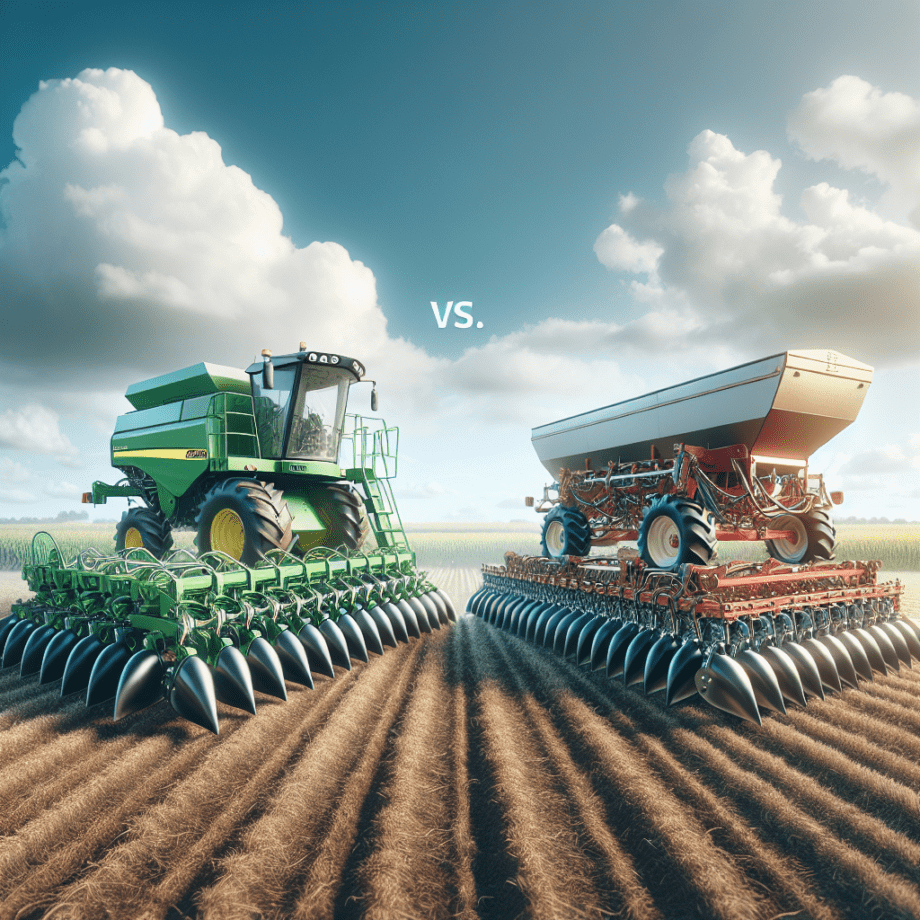Choosing the right seeding equipment is crucial for maximizing crop yield and ensuring efficient farm operations. Two popular options are air seeders and box drills, each with its own set of advantages and disadvantages. This article will delve into the specifics of both types of machinery to help you make an informed decision for your farm.
Understanding Air Seeders
Air seeders are advanced pieces of agricultural machinery designed to plant seeds using a stream of air. This technology allows for precise seed placement and uniform distribution, which can significantly improve crop yields. Air seeders are particularly beneficial for large-scale farming operations due to their efficiency and speed.
How Air Seeders Work
Air seeders operate by using a series of fans and tubes to transport seeds from a central hopper to the soil. The seeds are metered out at a controlled rate and then carried by air through tubes to the openers, which place the seeds into the soil. This method ensures that seeds are evenly distributed across the field, reducing the likelihood of gaps or overlaps.
Advantages of Air Seeders
- Precision: Air seeders offer high precision in seed placement, which can lead to better crop emergence and uniformity.
- Efficiency: These machines can cover large areas quickly, making them ideal for extensive farming operations.
- Versatility: Air seeders can handle a variety of seed types and sizes, making them suitable for diverse cropping systems.
- Reduced Soil Compaction: The design of air seeders often results in less soil compaction compared to traditional drills, promoting healthier soil structure.
Disadvantages of Air Seeders
- Cost: Air seeders are generally more expensive than box drills, both in terms of initial purchase price and maintenance costs.
- Complexity: The advanced technology used in air seeders can make them more complicated to operate and maintain.
- Power Requirements: These machines often require more horsepower to operate, which can increase fuel consumption.
Exploring Box Drills
Box drills, also known as grain drills, are traditional seeding machines that have been used for decades. They are simpler in design compared to air seeders and are often preferred by smaller farms or those with less complex seeding needs.
How Box Drills Work
Box drills consist of a seed box that holds the seeds and a series of tubes that deliver the seeds to the soil. The seeds are metered out by a mechanical system and dropped into furrows created by openers. The furrows are then covered by press wheels, ensuring good seed-to-soil contact.
Advantages of Box Drills
- Simplicity: Box drills are easier to operate and maintain due to their straightforward design.
- Cost-Effective: These machines are generally less expensive than air seeders, making them a more affordable option for smaller farms.
- Durability: Box drills are known for their robust construction and long lifespan, even under tough field conditions.
- Lower Power Requirements: They typically require less horsepower to operate, which can result in lower fuel costs.
Disadvantages of Box Drills
- Less Precision: Box drills may not offer the same level of precision in seed placement as air seeders, potentially leading to uneven crop emergence.
- Slower Operation: These machines generally cover less ground per hour compared to air seeders, which can be a drawback for larger farms.
- Limited Versatility: Box drills may not handle a wide variety of seed types and sizes as effectively as air seeders.
- Soil Compaction: The design of box drills can sometimes lead to increased soil compaction, which may affect soil health over time.
Factors to Consider When Choosing Between Air Seeders and Box Drills
When deciding between an air seeder and a box drill, several factors should be taken into account to ensure you select the right equipment for your farm’s specific needs.
Farm Size and Scale
The size of your farm is a critical factor in determining the most suitable seeding equipment. For large-scale operations, the efficiency and speed of air seeders can be a significant advantage. On the other hand, smaller farms may find box drills to be more cost-effective and easier to manage.
Crop Types and Seeding Requirements
Different crops have varying seeding requirements, and the versatility of air seeders can be beneficial for farms that grow multiple types of crops. If your farm focuses on a single crop or a limited variety, a box drill may suffice.
Budget Constraints
Budget is always a crucial consideration. While air seeders offer advanced features and higher efficiency, they come with a higher price tag. Box drills, being more affordable, might be the better option for farms with limited financial resources.
Soil Conditions
The condition of your soil can also influence your choice. Air seeders are generally better at minimizing soil compaction, which can be beneficial for maintaining soil health. However, if soil compaction is not a significant concern, a box drill may be adequate.
Technical Expertise
The level of technical expertise available on your farm is another important factor. Air seeders, with their advanced technology, may require more specialized knowledge for operation and maintenance. Box drills, being simpler, are easier to manage and repair.
Conclusion
Both air seeders and box drills have their own sets of advantages and disadvantages, and the right choice depends on various factors specific to your farm. Air seeders offer precision, efficiency, and versatility, making them ideal for large-scale operations and diverse cropping systems. However, they come with higher costs and complexity. Box drills, on the other hand, are simpler, more cost-effective, and durable, making them suitable for smaller farms or those with less complex seeding needs.
By carefully considering factors such as farm size, crop types, budget, soil conditions, and technical expertise, you can make an informed decision that will help optimize your seeding operations and ultimately improve your farm’s productivity.
